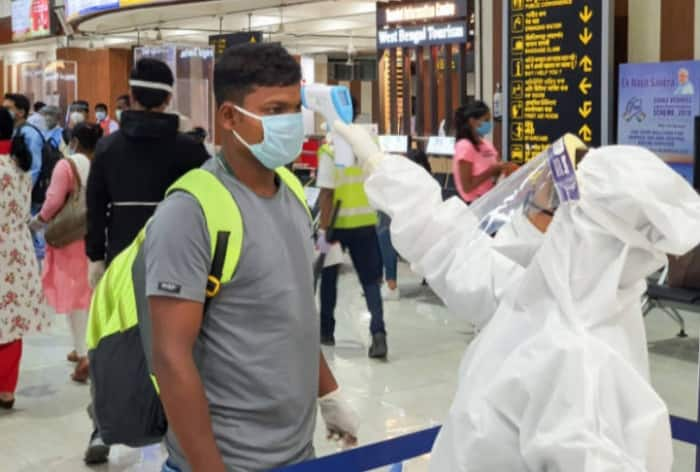The ministry has said the existing line of treatment for COVID-19 is expected to be effective against JN.1 infection and updated vaccines are expected to increase protection against the new variant.
COVID-19 updateThere are currently no plans to make RT-PCR tests for Covid-19 mandatory at airports for travelers in the country, the Union Health Ministry said on Thursday, amid a rise in coronavirus infections in India.
Citing Health Ministry sources, news agency ANI reported that there are no plans yet to make COVID-19 testing mandatory at airports across the country. “Currently, there is no plan so far to make RT-PCR testing for Covid mandatory at airports,” the report said, quoting an official source in the Health Ministry.
India had issued revised guidelines removing the requirement for RT-PCR based testing of a random 2 percent of travelers entering India in the month of July.
According to official sources, India reported a total of 21 cases of the COVID-19 JN.1 subvariant and there has been no increase in hospitalizations.
There has also been no increase in hospitalizations and COVID-19 is an incidental finding in people hospitalized for other medical conditions.
“The cases in the hospital are due to other medical conditions and COVID-19 is an incidental finding,” the sources said, according to the ANI report.
594 new cases today, 22 deaths in two weeks
The country recorded 594 new COVID-19 infections on Thursday, while the number of active cases rose to 2,669 from 2,311 the day before, according to Union Health Ministry data.
In the past two weeks, 22 people have died in India due to COVID-19, the data shows.
The death toll has risen to 5,33,327 and six more people – three from Kerala, two from Karnataka and one from Punjab – have succumbed to the viral disease, the data updated at 8 am showed.
Till Wednesday, as many as 21 cases of the JN.1 variant had been detected across the country.
NITI Aayog Member (Healthcare) Dr. VK Paul said on Wednesday that India’s scientific community is closely examining the new variant as he stressed the need for states to ramp up testing and strengthen surveillance systems.
No evidence of increased risk due to JN.1 variant
In view of the recent surge in COVID-19 cases and detection of the first case of the JN.1 variant in the country, the Center has urged states and union territories to maintain constant vigilance.
In a letter to states and union territories, Union Health Minister Sudhansh Pant on Monday underlined the crucial containment and management strategies of COVID-19 in view of the upcoming festive season and advised them to take necessary public health measures to reduce the risk of minimize increases in transmission. of the disease.
States have been urged to effectively adhere to the detailed operational guidelines for the revised COVID-19 surveillance strategy shared by the Union Ministry of Health and Family Welfare.
They have asked for regular monitoring and reporting of district-wise cases of Influenza Like Illness (ILI) and Severe Acute Respiratory Disease (SARI) in all health facilities so that the rising trend in the number of cases can be detected early.
It is currently unknown whether the JN.1 infection causes symptoms that differ from other variants, the ministry said. Overall, symptoms of COVID-19 are similar across variants, the report said, adding that there is also no indication of increased severity from JN.1
At this time, there is no evidence that JN.1 poses an increased risk to public health compared to other variants currently in circulation, the ministry said.
The existing line of treatment for COVID-19 is expected to be effective against JN.1 infection and updated vaccines are expected to increase protection against the variant, the ministry said.
(With input from agencies)


